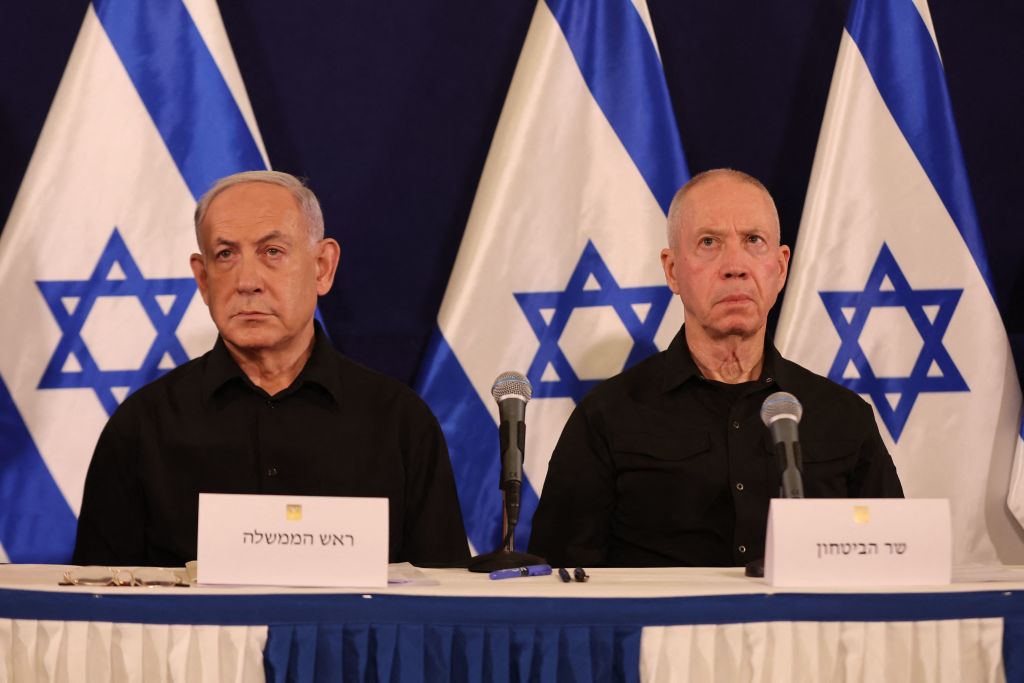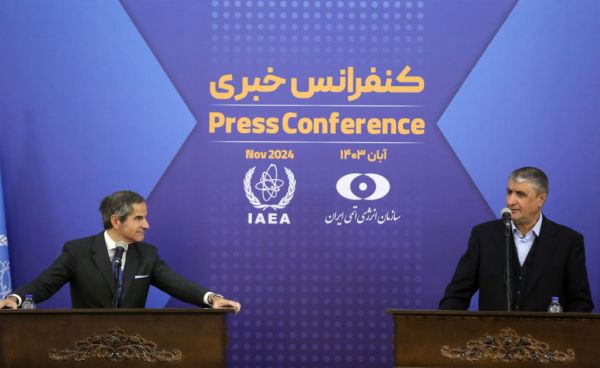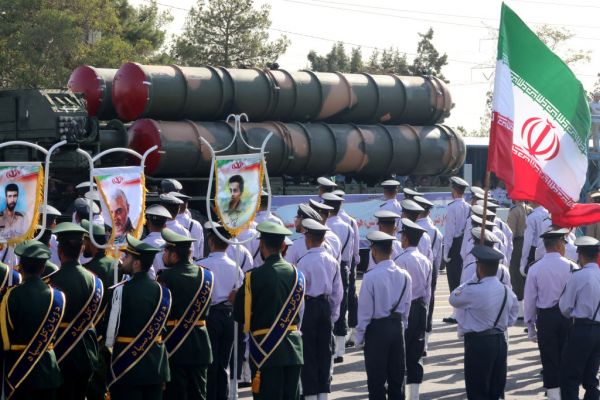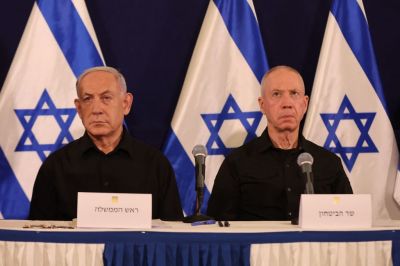Happy Tuesday! We thought we might have found the next Homeward Bound story when we heard about the mysterious appearance of Patagonian Mara—rabbit-like creatures native to Argentina—in the United Arab Emirates. But the pack seems to be thriving in their new home.
Maybe they’re just trying to avoid Javier Milei’s chainsaw and brood of English mastiffs.
Quick Hits: Today’s Top Stories
- Special counsel Jack Smith on Monday filed motions to dismiss both the federal election interference and classified documents cases against President-elect Donald Trump. Trump’s legal team made no objections to the requested dismissals. “It has long been the position of the Department of Justice that the United States Constitution forbids the federal indictment and subsequent criminal prosecution of a sitting president,” Smith wrote in the election interference case motion. Such prohibitions “apply to this situation and that as result this prosecution must be dismissed before the defendant is inaugurated,” he wrote. Smith requested that the classified documents case continue for Trump’s two co-defendants “because, unlike defendant Trump, no principle of temporary immunity applies to them.”
- Officials in the United Arab Emirates (UAE) said Monday that police had arrested three Uzbek nationals in connection to the murder of Rabbi Zvi Kogan, an Israeli-Moldovan dual citizen whose body was found over the weekend following a four-day search. Israeli media outlets have suggested that the trio could have been working under the direction of Iran. The Iranian embassy in the UAE denied involvement, and Emirati officials have not named any sponsor group or country as responsible for the suspected terrorist attack.
- Cǎlin Georgescu, an independent, far-right Romanian presidential candidate, advanced on Sunday to the presidential election run-off after winning a surprising plurality in the first round of voting. Georgescu is a fierce critic of NATO, has lauded Russian President Vladimir Putin, and was previously expelled from the far-right Alliance for the Union of Romanians for praising leaders of the World War II-era fascist Iron Guard movement. He will face pro-NATO, pro-Europe conservative Elena Lasconi in a December 8 vote.
- Russian missiles and drones struck the Ukrainian cities of Kharkiv, Kyiv, Odesa, and Zaporizhzhia on Monday, killing 23 people and injuring 41. Russian troops also pressed assaults along the front in eastern Ukraine, attacking the settlement of Kozacha Lopan and initiating an amphibious assault across the Oskil River in eastern Kharkiv.
- Supporters of jailed former Pakistani Prime Minister Imran Khan attempted to break through police barricades around the capital of Islamabad on Monday, as the city remains on lockdown following Khan’s calls for a “final protest” against his detention. Khan, who has been imprisoned for more than a year on 150 criminal charges that he claims are politically motivated, is still a popular figure with the Pakistani public who see him as challenging the military’s power. Pakistani authorities said one policeman had been killed and 50 injured in the clashes.
- Some workers represented by the Service Employees International Union at Charlotte International Airport went on strike Monday, seeking higher wages as the country enters one of the busiest travel weeks of the year. The strike is scheduled to last 24 hours, and American Airlines—for which Charlotte is a main hub—has said it does not expect dramatic disruptions.
Of Warrants and War

Last Thursday, just after the 79th anniversary of the beginning of the Nuremberg trials, the International Criminal Court (ICC) in the Hague charged Israeli Prime Minister Benjamin Netanyahu and former Defense Minister Yoav Gallant with war crimes. In a statement, the court said that it found “reasonable grounds” to suspect that Netanyahu and Gallant “each bear criminal responsibility for … the war crime of starvation as a method of warfare; and the crimes against humanity of murder, persecution, and other inhumane acts.”
On the one hand, the warrants were a bombshell: The ICC, which is charged with investigating war crimes and crimes against humanity, for the first time issued an arrest warrant for the sitting head of state of a well-established democracy. On the other, little is expected to come of the charges, issued by a court with a contested jurisdiction and no police force. The warrants may ultimately serve primarily as a distraction at a moment when the focus of Israel’s war is shifting from Hamas in Gaza and toward direct conflict with its most powerful enemy: Iran.
The ICC on Thursday also said that Mohammed Deif, the commander-in-chief of Hamas’ military wing, should be arrested on suspicion of having committed “crimes against humanity of murder, extermination, torture, and rape and other forms of sexual violence; as well as the war crimes of murder, cruel treatment, torture, taking hostages, outrages upon personal dignity, and rape and other forms of sexual violence.” The problem with the warrant against Deif, though, is that he’s likely dead. In August, the Israel Defense Forces (IDF) confirmed that he had been killed by a July airstrike, but Hamas has yet to confirm Deif’s status. The ICC does not try people in absentia or posthumously.
Charging one of the key orchestrators of the October 7, 2023, attacks alongside two leaders of the country that he targeted may be the ICC’s ham-fisted attempt at even-handedness. In reality, it likely draws a false equivalence between leaders of a democracy at war and a terrorist organization.
“There’s this obsession that if you’re going to accuse one side of doing something wrong, you have to be fair and accuse both sides,” Geoffrey Corn, the director of the Center for Military Law and Policy at Texas Tech University, told TMD. “That’s corrosive, because the reality is that there was no plausible debate over the culpability of Hamas leadership.”
Some 125 countries have signed on to the Rome Statute, which establishes ICC jurisdiction over war crimes and crimes against humanity within their borders. Israel—like the U.S.—has never signed the treaty, meaning the court has no jurisdiction to prosecute individuals there. Several countries that do recognize the ICC have indicated they would act on the warrants—including the Netherlands, Canada, Ireland, Spain, and Denmark—but could only do so if Netanyahu or Gallant set foot there.
The U.S., meanwhile, strongly rejected the court’s decision. “The ICC issuance of arrest warrants against Israeli leaders is outrageous,” President Joe Biden in a statement the same day the warrants were announced. “Let me be clear once again: whatever the ICC might imply, there is no equivalence—none—between Israel and Hamas.”
Other countries’ reactions have been mixed, with most major powers remaining noncommittal or actively rejecting the ICC request to arrest the leaders of a Western-style democracy. China, France, and Britain all released relatively neutral statements, with France’s foreign ministry saying that it “took note” of the decision. A spokesman for Germany’s foreign ministry said that he would “find it hard to imagine that we would make arrests on this basis,” noting that “it is a consequence of German history that we share unique relations and a great responsibility with Israel.”
All this comes as the ICC’s legitimacy faces other challenges in light of allegations against its chief prosecutor, Karim Khan. Last month, ICC staff told the Guardian that Khan had sexually harassed a younger lawyer working on the case, then pressured her to drop the allegations when he learned that court officials had been informed of her accusations. The court this month reportedly launched an external investigation into the allegations.
The warrants also come at a time when Israelis, and indeed Jews, around the world already feel embattled. “It’s an antisemitic step that has one goal—to deter me, to deter us from having our natural right to defend ourselves against enemies who try to destroy us,” Netanyahu said in his denunciation of the warrants. Three Israelis were killed by a gunman at the border of Jordan and Israel in September, supporters of an Israeli soccer team were systematically targeted in attacks in Amsterdam earlier this month, and an Israeli-Moldovan rabbi was murdered in the UAE last week.
Meanwhile, Israel continues to fend off near-daily assaults from multiple adversaries, including Hezbollah, an Iranian-backed terrorist group that began attacking Israeli communities in solidarity with Hamas after October 7. Last month, Israeli forces invaded southern Lebanon to push Hezbollah back from the border and prevent it from launching its own October 7-style ground invasion. Israel and Iran have also traded fire, with Israel’s first major strikes against the Islamic Republic damaging ballistic missile production sites and disabling much of the country’s air defenses last month.
Both campaigns have proven more successful than many anticipated. Iran’s aerial attacks on Israel have been almost entirely thwarted. And Hezbollah, long considered to be Israel’s most formidable non-state adversary, proved to be far less than a match for the IDF, particularly following a series of targeted strikes that left the terrorist group’s leadership effectively decapitated.
“This is an example of what Israelis are capable of when they take a threat seriously,” said Raphael Cohen, the director of the strategy and doctrine program at the RAND Corporation, noting that, during a recent visit to Israel, he spoke with Israeli officials who believed that a full-scale conflict with Hezbollah would result in 3,000 rockets a day being fired into Israel. The actual number has been closer to 150.
Israel’s success in Lebanon has in recent days made the prospect of a ceasefire in the north appear more likely. U.S. Special Envoy Amos Hochstein, the State Department’s point person in ongoing ceasefire negotiations, traveled to Israel and Lebanon last week. On Monday, a senior U.S. official told Axios Israel and Lebanon had agreed to a ceasefire agreement, although neither country has officially announced such a deal. The Israeli Cabinet is expected to meet on Tuesday evening to discuss the deal.
The draft agreement reportedly creates a process—under U.S. oversight—in which Israeli forces have 60 days to withdraw from Lebanon to be replaced by forces from the regular Lebanese army. During that period, Hezbollah would move its heavy weapons north of the Litani River in southern Lebanon. The deal apparently also includes a promise of U.S. support for Israel to respond to any imminent threats from Lebanon not handled by the Lebanese army.
A ceasefire in Lebanon may be easier for Israel to achieve than a long-term plan for Gaza. More than a year after Hamas’ attack, the IDF continues to operate in Gaza with much more expansive military goals than in Lebanon: the destruction of Hamas and the freeing of the roughly 100 maintaining hostages held by the terrorist group. The Israeli government, meanwhile, seems no closer to creating a framework for what will happen to the enclave after Hamas is defeated. The Israeli public is opposed to the creation of a Palestinian state as part of a ceasefire deal, and Netanyahu’s government has generally shown little inclination to be directly involved in Gaza’s postwar governance.
But hardliners in the Cabinet—including Finance Minister Bezalel Smotrich and National Security Minister Itamar Ben-Gvir—want to reestablish Jewish settlements in Gaza, raising questions about the enclave’s Arab population. “We can [also] do something else—encourage emigration. The truth is, this is the most ethical and the most correct solution,” Ben-Gvir said last month.
“I think it would be a strategic blunder, not to mention an international political one” to re-occupy the strip, Cohen told TMD. Such a move would also be unpopular among the broader Israeli public.
Whatever happens in Lebanon and Gaza, though, Israeli politicians—and, increasingly, the Israeli public—are convinced that Iran remains the country’s most fundamental security threat.
“The thing that comes out very clearly when you talk to Israelis now is, that they don’t see this as an Israel-Hezbollah or an Israel-Palestinian war,” Cohen said. “This is an Israel-Iran war.” Iran has armed, trained, and directed Hezbollah and Hamas as part of its so-called “Axis of Resistance” across the region. But it’s the Islamic Republic’s seemingly ever-expanding nuclear program that poses an even greater existential threat to the Jewish state. “Until the question of the Iranian nuclear program is resolved, I don’t think that the Israel-Iran problem is done,” Cohen told TMD.
At the behest of the White House, Israel has maintained that it refrained from directly hitting Iranian nuclear targets during strikes last month that disabled much of Iran’s air defenses. The country has previously undermined Iran’s nuclear research efforts through intelligence operations like the theft by Mossad agents of tens of thousands of pages of classified material in 2018, or the 2020 assassination of a top Iranian nuclear scientist with a remote-controlled machine gun hidden inside a vehicle. And reports from earlier this month suggested that Israel’s recent strikes against Iran did, in fact, destroy a nuclear research facility.
Iran nevertheless remains close to being able to build a nuclear bomb. According to estimates from the U.N.’s International Atomic Energy Agency, Iran can enrich enough weapons-grade uranium for multiple weapons within a week, although completing the bombs themselves would take several months to roughly a year.
With Iran’s technical ability and resolve to persist with a nuclear program as the deciding factor, Cohen anticipates some sort of conflict between Iran and Israel continuing for the foreseeable future.
“The question is, will this continue in the overall fashion? Does it go back to being a shadow war?” he said. “There’s a little bit of flex of what form it takes, but that the war will continue is pretty much a foregone conclusion.”
Worth Your Time
- Reporter Oliver Roeder has questions about time. “Caesium is a soft, silvery-gold metal that becomes liquid when stored in a warm room,” he explained for the Financial Times. “Its main commercial use is as an ingredient in drilling fluids for petroleum exploration. But thanks to quirks of chemistry and history, caesium is also the metronome of the world, the ultimate source of all modern time.” The vibration of one atom of Caesium became the international standard for the length of a second in 1967. But that could be changing. “Modern timekeeping has improved by about an order of magnitude per decade, Moore’s law for clocks. We now measure time to its quintillionth part. At this level of particularity, the latest principles of physics, and those yet to be discovered, are laid bare on tables in small rooms in otherwise unremarkable basements. Reckoning with this new precision, the world’s foremost timekeepers and clockmakers, the men and women who maintain the measure of our days, are also grappling with a fundamental question of international political importance. How long is a second?”
- Writing for Persuasion, Michał Kranz argued that Donald Trump’s election and the potential end of the war in Ukraine present both challenges and opportunities for Eastern European security. “The likely conclusion of the war in Ukraine during Trump’s first year in office will only be the tip of the iceberg of the transformations on the horizon for Eastern Europe,” Kranz wrote. “States in the region, most notably Poland and the Baltics, are already looking beyond Ukraine to a scenario in which Russia might soon be ready to unleash its war machine on NATO’s East itself, which, without ironclad American security guarantees, would be more vulnerable than ever. And yet, for Eastern Europe, this tense moment offers surprising opportunities. In the absence of America’s guiding and often constraining hand, they will have the chance to redefine their own defense future, reap the rewards of the post-war economic order in Ukraine, and finally force Western Europe to confront the realities of the multipolar world head-on.”
Presented Without Comment
New York Times: Regulator Sues Anti-Police Activist Who Spent Charity Funds on Himself
The District of Columbia’s attorney general on Monday sued an activist known for his calls to abolish the police, saying that he diverted $75,000 from a charity to pay for mansion rentals, a trip to Cancún and designer clothes.
Also Presented Without Comment
Reuters: Brawl Erupts in Serbian Parliament
In the Zeitgeist
Netflix released the trailer for part one of its adaptation of One Hundred Years of Solitude, Gabriel García Márquez’s Pulitzer-Prize-winning—and Encanto-inspiring—1967 novel. But this, unlike Wicked, is actually advertised as the first of, presumably, two parts.
Toeing the Company Line
- In the newsletters: Kevin suggested (🔒) that arguments over process vs. outcomes are the ultimate dividing line between classical liberalism and populism, and Nick unpacked (🔒) the reaction on the right to Trump’s selection for secretary of labor.
- On the podcasts: Sarah and David explore the realities of the Department of Government Efficiency on Advisory Opinions.
- On the site today: Chris looked back at Huey Long, 1930s populism, and the Chaco War between Bolivia and Paraguay and Mike interviewed Steve Bannon.
Let Us Know
What lasting effect, if any, do you think the arrest warrants will have? Do you think a ceasefire in the north could give way to one in Gaza?








Please note that we at The Dispatch hold ourselves, our work, and our commenters to a higher standard than other places on the internet. We welcome comments that foster genuine debate or discussion—including comments critical of us or our work—but responses that include ad hominem attacks on fellow Dispatch members or are intended to stoke fear and anger may be moderated.
With your membership, you only have the ability to comment on The Morning Dispatch articles. Consider upgrading to join the conversation everywhere.